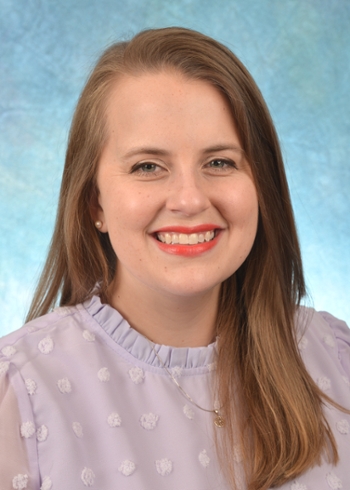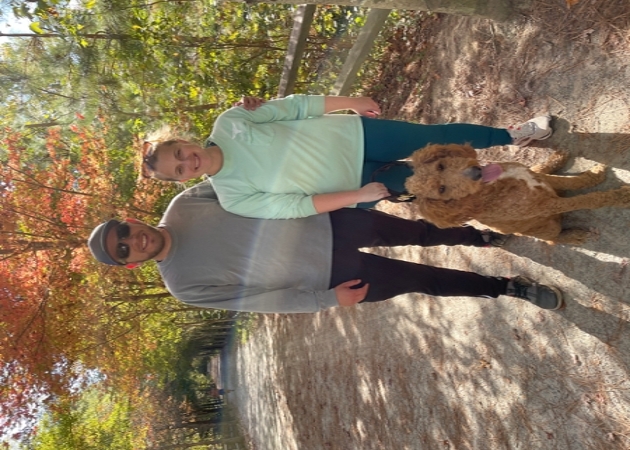Meghan E. Rebuli, PhD
Assistant Professor of Pediatrics, Center for Environmental Medicine, Asthma, and Lung Biology
Director of Graduate Studies, Curriculum in Toxicology and Environmental Medicine
Vice Chair, Institutional Review Board
University of North Carolina at Chapel Hill

Three statements about you – two true, one false.
- I speak Spanish and French.
- I’ve been an amateur radio operator since I was nine years old.
- I regularly play video games in my downtime.
Give us your ‘elevator pitch’ biography.
I was born, raised, and trained in North Carolina. I earned a bachelor of science and a doctoral degree from North Carolina State University in Raleigh and completed my postdoctoral training at the University of Nort Carolina at Chapel Hill. I completed my doctoral thesis with Dr. Heather Patisaul on research in neuroendocrine toxicology on the effects of Bisphenol A ingestion on neurodevelopmental and behavioral sex differences. I then switched models and organ systems and studied respiratory toxicology and the effects of e-cigarettes and wood smoke on respiratory immune health in my postdoctoral research under Dr. Ilona Jaspers. I stayed on at the University of North Carolina at Chapel Hill as an Assistant Professor and began my research program investigating the sex-specific effects of air pollutants and new and emerging tobacco products on respiratory health.
Specifically, I am interested in how the interaction of sex, both genetic and hormonal, and inhaled toxicants can alter respiratory health at the individual level and population level. I investigate these questions using in vivo prospective and observational clinical studies and translational cell culture models. My laboratory team has recently grown to four graduate students and two postdocs (one co-mentored) and I’m excited to report that my very first graduate student is well on their way to graduating! Interacting with my team, helping them develop into independent scientists, and seeing where their work leads our next hypotheses is what makes me excited to come to work every day.
Beyond my research, I am passionate about mentoring and ethics and have taken on roles as director of graduate studies of the curriculum in toxicology and environmental medicine, and as vice chair for one of the Institutional Review Boards at UNC. As director of graduate studies, I get to interact regularly with graduate students and ensure that they make timely progression towards their degree milestones, which is one of my favorite parts of the job.
In addition to my work life, I’m married to my husband of almost 10 years (Christian) and we have a three-year-old golden doodle (Nico). Nico was the best addition to our family during the COVID pandemic and we stay busy ensuring he gets plenty of attention and exercise.
What would you tell yourself as an Early Career Professional?
Keep finding and working with excellent, kind, and passionate mentors. They will be critical in pushing you to achieve your best, providing an encouraging and healthy work environment, and being wonderful role models for what can be accomplished. I owe a lot to my graduate school and postdoctoral mentors, Heather Patisaul and Ilona Jaspers. I would not be where I am today without their guidance and advocacy.
Don’t be afraid set your sights on goals that seem too far out of reach. You have to be in it to win it! Many people in science and research, including myself, experience imposter syndrome, but often we are way more prepared for new challenges than we lead ourselves to believe (especially women!). Some of the accomplishments I’ve achieved were only because I was encouraged to throw my hat into a ring that I thought was out of reach.
If you weren’t in medicine, and were in a different industry altogether, what would you be?
A marine biologist, baker, or science fiction/fantasy book reviewer.

What is your favorite way to spend a day off?
A slow morning with my husband and dog making breakfast and watching soccer, followed by visiting somewhere new to explore with my husband, mom, and dad (i.e., a museum, vineyard, outdoor festival, or market, etc.), then dinner at a local restaurant.
What areas of medicine are you most excited to see develop?
Environmental medicine. As a toxicologist, I would love to see environmental exposure assessments incorporated into clinics and preventative care. We’re exposed to thousands of chemicals every day from a variety of sources, yet the health impacts are not well understood. With inclusion of environmental exposure assessments into clinical care, new sources and root causes of health effects could be identified and patients may be able to use this information to reduce exposures and improve their own health and wellbeing.
I would also be excited to see U.S. regulatory agencies take a more precautionary approach to risk assessment, rather than reactive. This would require new products or chemicals developed for human use or interaction to be thoroughly assessed for safety prior to being released in the market, rather than our current approach of allowing products to be released, identifying that they are potentially a problem, and then waiting years to take regulatory action (e.g. e-cigarettes, bisphenol A in food containers, and PFAS, generally).
What is one advancement in your field you’d like to see in your career?
I would like to see the development of sex-specific therapeutics, supplements, or preventative drugs to mitigate the adverse respiratory effects of air pollution exposure. We’re identifying sex differences regularly in response to respiratory toxicants and more generally at baseline and in respiratory disease, but mechanisms are still elusive, so there is some work to be done to get to targets for therapeutics, but I think it could happen within the life of my career. This work would greatly advance the pursuit of precision medicine and especially benefit women who have been historically understudied.
Which statement did you make up?
The first one! I speak Spanish and English, but haven’t picked up French yet.

